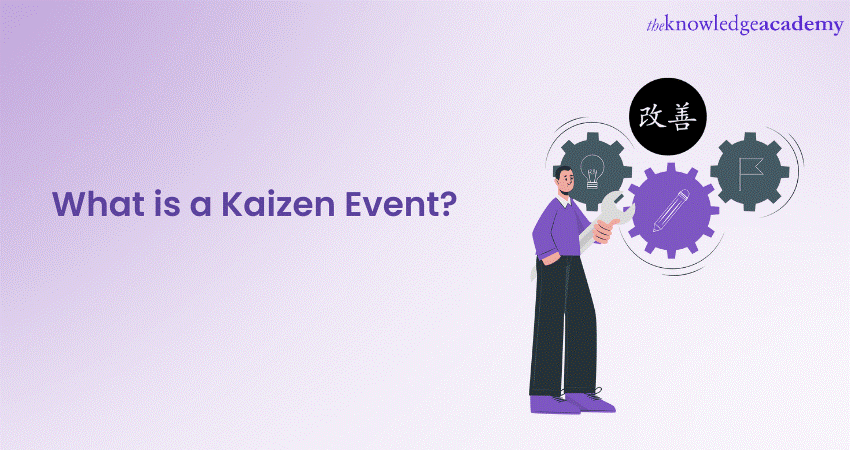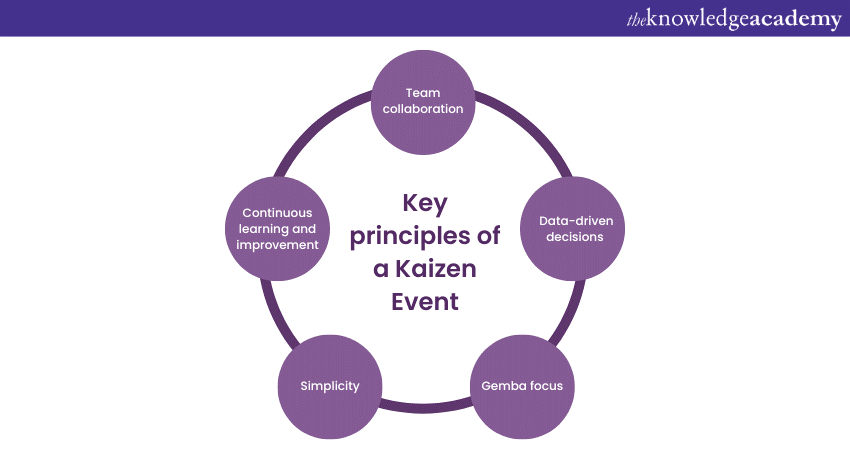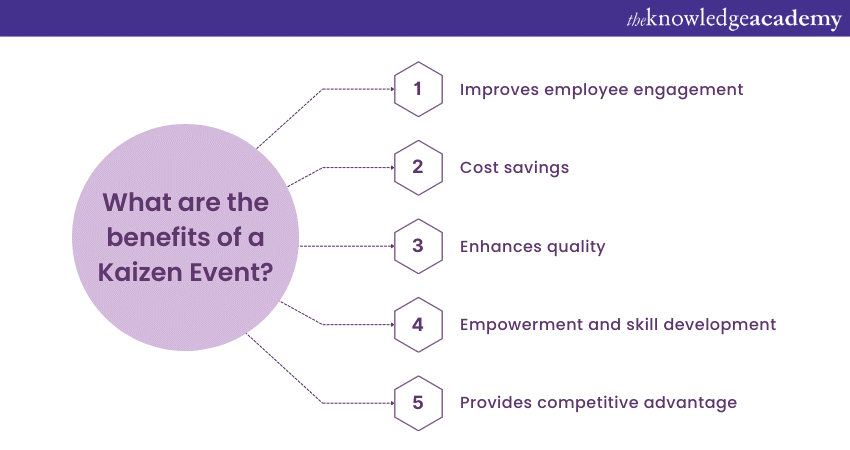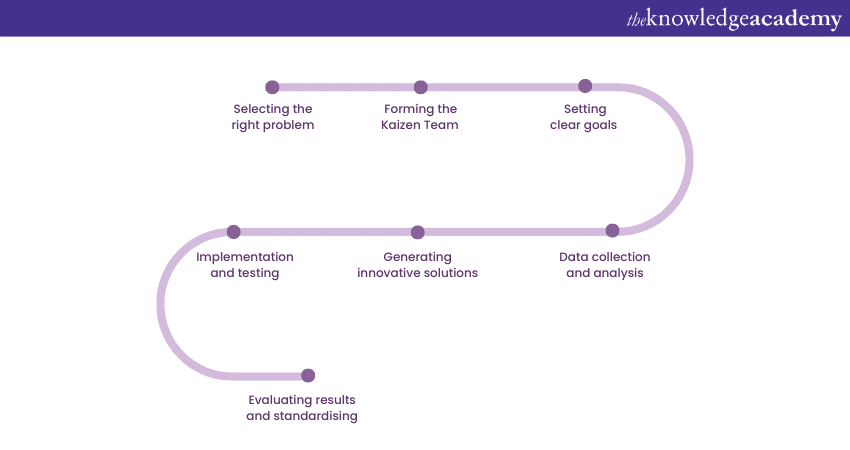We may not have the course you’re looking for. If you enquire or give us a call on +64 98874342 and speak to our training experts, we may still be able to help with your training requirements.
Training Outcomes Within Your Budget!
We ensure quality, budget-alignment, and timely delivery by our expert instructors.

In today's competitive era, organisations are constantly seeking ways to improve their processes, enhance efficiency, and optimise productivity. One methodology that has gained major recognition for achieving these goals is Kaizen, a Japanese term that translates to "continuous improvement."
A key component of Kaizen methodology is the "Kaizen Event," a focused and intensive improvement process, designed to bring about rapid and sustainable changes in a specific area of an organisation. This blog shall provide a quick overview of Kaizen Event, its principles, processes, and the benefits on offer to businesses.
Table of Contents
1) What is a Kaizen Event?
2) Key principles of Kaizen Event
3) What are the benefits of Kaizen Events?
4) How to conduct a Kaizen Event?
5) Conclusion
What is a Kaizen Event?
Kaizen, originating from Japanese words meaning "change" (Kai) and "good" (Zen), is a philosophy centred around the concept of continuous improvement. It was first introduced in Masaaki Imai’s book "Kaizen: The Key to Japan's Competitive Success" in 1986. Kaizen emphasises making small, incremental changes to processes, products, or services to achieve efficiency gains and quality improvements over time.
A Kaizen Event, often referred to as a Kaizen Blitz or Kaizen Workshop, is a concentrated and time-bound improvement activity that brings together a cross-functional team to work intensively on solving a specific problem or enhancing a targeted process. Unlike traditional improvement methods that can span months, Kaizen Events are designed to yield results in a much shorter time frame, typically lasting a few days to a week.

Key principles of a Kaizen Event

The success of Kaizen Events is underpinned by a set of key principles that guide the methodology and its implementation. These principles not only shape the way Kaizen Events are conducted but also contribute to the overall effectiveness of continuous improvement efforts within an organisation.
1) Team collaboration
Collaboration is a cornerstone of Kaizen's philosophy. In a Kaizen Event, individuals from various departments and levels of expertise come together as a cross-functional team. This diversity ensures that a wide range of perspectives and insights are considered during problem-solving and decision-making.
By involving individuals with different skill sets and backgrounds, the Kaizen Event leverages the collective knowledge of the team, fostering a culture of inclusivity and cooperation. This collaborative approach often results in creative solutions that might not have been identified in a siloed environment.
2) Data-driven decisions
Kaizen Events are grounded in data and evidence. Decisions made during the event are not based on assumptions or gut feelings but are supported by concrete data collected through observation, measurement, and analysis. This data-driven approach ensures that improvements are targeted and focused on key areas that will have the most significant impact.
By relying on data, organisations can avoid the pitfalls of implementing changes that may seem intuitive but lack empirical support. This principle reinforces the idea that improvement efforts should be guided by objective information rather than subjective opinions.
3) Gemba focus
The concept of "Gemba" refers to the actual place where work is being done—the shop floor, the production line, the customer service centre, or any location where value is created. Kaizen Events emphasise the importance of going to the Gemba to observe processes and gather insights directly from those involved in the day-to-day operations.
This practice allows the team to get a holistic understanding of the current state of affairs and identify issues that might be overlooked when analysing data from a distance. By immersing themselves in the work environment, participants can identify inefficiencies, bottlenecks, and potential improvements that might not be apparent from a bird's-eye view.
4) Simplicity
Kaizen Events prioritise practicality and simplicity when devising solutions. Rather than seeking complex, grandiose changes, the emphasis is on finding straightforward and manageable improvements that can be swiftly implemented. This principle aligns with the idea that small, incremental changes are more manageable for both employees and the organisation as a whole.
Simple solutions are also more likely to be embraced and sustained over time. By focusing on simplicity, Kaizen Events avoid the common pitfall of overcomplicating solutions, something that can lead to resistance and implementation challenges.
5) Continuous learning and improvement
At the heart of Kaizen's philosophy is the commitment to ongoing learning and improvement. This principle extends beyond the duration of a Kaizen Event, emphasising that the process of improvement is never truly complete. The insights gained from one event feed into the next, creating a cycle of continuous enhancement.
This culture of perpetual learning ensures that organizations remain adaptable in the face of change and are better equipped to navigate evolving market conditions. By fostering a mindset of continuous improvement, Kaizen Events contribute to an organization's long-term success.
Elevate your expertise in Kaizen with our Certified Kaizen Foundation and Practitioner Course—Register now to lead impactful changes in your organisation!
What are the benefits of a Kaizen Event?

The adoption of Kaizen Events can bring about plenty of benefits that contribute to an organisation's growth, efficiency, and overall success. From rapid improvements to cultural transformation, the advantages of incorporating Kaizen Events into your business strategy are numerous and impactful. Here are some of the benefits:
1) Rapid improvements
One of the most important benefits of Kaizen Events is their ability to deliver rapid and tangible improvements. Unlike traditional improvement initiatives that can span months or even years, Kaizen Events are designed to yield results within a compressed time frame, often lasting just a few days to a week. This rapid pace of improvement ensures that pressing issues are addressed promptly, preventing them from escalating and negatively impacting the organisation's performance.
2) Employee engagement
Kaizen Events place employees at the centre of the improvement process. By involving frontline workers in problem-solving and decision-making, organisations tap into their valuable insights and expertise. This engagement not only empowers employees but also fosters a sense of ownership and responsibility for the outcomes. When employees see that their contributions are valued and lead to meaningful changes, their motivation and job satisfaction increase, contributing to a more positive work environment.
3) Cost savings
Addressing inefficiencies and streamlining processes through Kaizen Events can result in significant cost savings. By identifying and eliminating wasteful practices, organisations can reduce resource consumption, minimise downtime, and optimise resource allocation. These financial benefits are not only immediate but also cumulative over time as the organisation continues to operate more efficiently in the long run.
4) Cultural transformation
Kaizen Events play a vital role in fostering a culture of continuous improvement and innovation. When organisations regularly engage in Kaizen, it becomes a part of their DNA. Employees learn to identify opportunities for improvement in their daily work and are encouraged to contribute their ideas for enhancement. Over time, this culture of continuous improvement becomes ingrained in the organisation's values, leading to an environment where innovation and progress are the norm.
5) Enhanced quality
Quality improvements often go hand in hand with Kaizen Events. As teams work together to identify and rectify problems, they also refine processes to ensure consistency and higher-quality outputs. Through data-driven decision-making and the implementation of efficient practices, organisations can enhance the quality of their products/services, resulting in increased customer satisfaction and loyalty.
6) Reduced resistance to change
The incremental nature of Kaizen Events helps mitigate resistance to change that can often accompanies larger-scale transformations. Because Kaizen Events focuses on small, manageable improvements, employees are highly likely to embrace the changes. This gradual approach allows for smoother transitions and greater acceptance, as employees can witness the benefits of the changes firsthand.
7) Empowerment and skill development
Participation in Kaizen Events empowers employees to contribute their expertise and take an active role in shaping their work environment. This involvement nurtures a sense of personal and professional growth as employees develop problem-solving skills, teamwork abilities, and a deeper understanding of the organisation's operations. As a result, employees become more adaptable and resourceful, contributing to a more skilled and versatile workforce.
8) Competitive advantage
In a business landscape marked by rapid changes and fierce competition, organisations that embrace Kaizen Events gain a competitive edge. The ability to swiftly adapt, improve, and innovate sets them apart from competitors that might be slower to respond to challenges. This advantage can be particularly impactful in industries where agility and responsiveness are key drivers of success.
Master the fundamentals of Kaizen with our Certified Kaizen Foundation Training Course. Sign up now for a transformative journey towards continuous improvement!
How to conduct a Kaizen Event?

Implementing a successful Kaizen Event requires a structured approach that guides the team through the process of problem identification, solution generation, and implementation. Following these steps ensures that the event remains focused, efficient, and results-driven.
1) Selecting the right problem
The success of a Kaizen Event begins with identifying the right problem to tackle. This problem should be specific, measurable, and aligned with the organisation's goals. Consider involving frontline employees who have firsthand experience with the processes to pinpoint areas that need improvement. It's crucial to select a problem that has a significant impact and can be realistically addressed within the event's timeframe.
2) Forming the Kaizen Team
Form a cross-functional team with diverse expertise and perspectives. This team should include individuals directly involved in the process as well as those who have a broader understanding of the organisation's operations. A mix of roles and backgrounds ensures that various viewpoints are considered, leading to well-rounded solutions. The team's composition should reflect a commitment to collaboration and open communication.
3) Setting clear goals and scope
Clearly define the goals of the Kaizen Event. What specific improvements are you aiming to achieve? Establish measurable goals that will help track progress and evaluate the success of the event. Equally important is defining the scope of the event. What are the boundaries of the process being addressed? A clear scope prevents the team from getting sidetracked and ensures that efforts remain focused on the identified problem.
4) Data collection and analysis
Gather relevant data about the current state of the process. This data might include cycle times, error rates, customer feedback, and other key performance indicators. Evaluate the data to identify bottlenecks, inefficiencies, and patterns that contribute to the identified problem. This analysis serves as the foundation for informed decision-making during the event.
5) Generating innovative solutions
Conduct brainstorming sessions with the Kaizen team to generate potential solutions. Encourage a free exchange of ideas and creativity. Analyse each solution based on its feasibility, potential impact on the problem, and alignment with the defined objectives. The goal is to identify a set of practical solutions that can be adopted within the event's timeframe.
6) Implementation and testing
Develop an action plan for implementing the selected solutions. Assign responsibilities to team members and make a timeline for execution. Implement the changes on a small scale, preferably in a controlled environment, to check their effectiveness. This testing phase allows the team to identify any unforeseen challenges or adjustments that need to be made before full-scale implementation.
7) Evaluating results and standardising
Compare the outcomes of the implemented changes against the objectives set at the beginning of the event. Did the solutions lead to the desired improvements? Gather feedback from employees who were directly involved in the process to gain insights into the changes' impact. If the results meet expectations, standardise the new process by documenting best practices, creating standard operating procedures, and communicating the changes to relevant stakeholders.
Conclusion
The Kaizen Event methodology represents a powerful tool for organisations seeking rapid yet impactful improvements. By following its principles and employing a structured approach, businesses can unlock new levels of efficiency, quality, and employee engagement. Embracing the philosophy of continuous improvement through Kaizen Events can lead to transformative changes and a brighter future for any organisation.
Unlock the power of continuous improvement with our Kaizen Training.
Frequently Asked Questions
Upcoming Business Improvement Resources Batches & Dates
Date
 Certified Kaizen Foundation & Practitioner
Certified Kaizen Foundation & Practitioner
Thu 16th Jan 2025
Thu 6th Mar 2025
Thu 22nd May 2025
Thu 24th Jul 2025
Thu 18th Sep 2025
Thu 20th Nov 2025
Thu 11th Dec 2025







 Top Rated Course
Top Rated Course


 If you wish to make any changes to your course, please
If you wish to make any changes to your course, please


